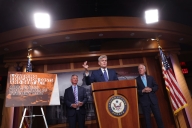You have /5 articles left.
Sign up for a free account or log in.
A second federal appeals court ruled Monday against President Trump’s travel ban, upholding an injunction imposed by a lower court. The Trump administration has asked the Supreme Court to rule on the president’s executive order banning entry into the U.S. for nationals of Iran, Libya, Somalia, Sudan, Syria and Yemen, which Trump argues is necessary to prevent the entry of terrorists. Critics of the ban see it as a pretext for banning the entry of Muslims, a step Trump called for in his campaign.
The U.S. Court of Appeals for the Fourth Circuit, which is based in Virginia, had already ruled against the Trump administration, finding that the travel ban amounted to religious discrimination. In its ruling Monday, the U.S. Court of Appeals for the Ninth Circuit, which is based in California, found that the president had exceeded his authority in issuing the order, which also suspended and capped the refugee admissions program.
“The Immigration and Nationality Act (‘INA’) gives the president broad powers to control the entry of aliens, and to take actions to protect the American public,” the court ruled. “But immigration, even for the president, is not a one-person show. The president’s authority is subject to certain statutory and constitutional restraints. We conclude that the president, in issuing the executive order, exceeded the scope of the authority delegated to him by Congress. In suspending the entry of more than 180 million nationals from six countries, suspending the entry of all refugees and reducing the cap on the admission of refugees from 110,000 to 50,000 for the 2017 fiscal year, the president did not meet the essential precondition to exercising his delegated authority: the president must make a sufficient finding that the entry of these classes of people would be ‘detrimental to the interests of the United States.’ Further, the order runs afoul of other provisions of the INA that prohibit nationality-based discrimination and require the president to follow a specific process when setting the annual cap on the admission of refugees.”
The suit was filed by the state of Hawaii, which -- as key to its argument to proving it had standing to sue -- asserted harm to the University of Hawaii’s ability to enroll students and attract visiting faculty and scholars from the six countries. The appeals court ruling cites a filing from the state of Hawaii asserting that the university had admitted 11 graduate students from the six countries and was reviewing applications from another 21 affected applicants. The court cites this application and acceptance data “as further evidence that [the executive order] will harm the state because students affected by Section 2(c) may not attend the university, and the university will lose tuition and educational benefits.” Section 2(c) is the provision of the executive order imposing the six-country travel ban.
Monday's unanimous ruling by a three-judge panel keeps in place the injunction on provisions of the executive order dealing with the travel ban and restrictions on the refugee program, but vacates the part of the injunction that prevented the government from moving ahead with internal reviews of visa vetting processes.




